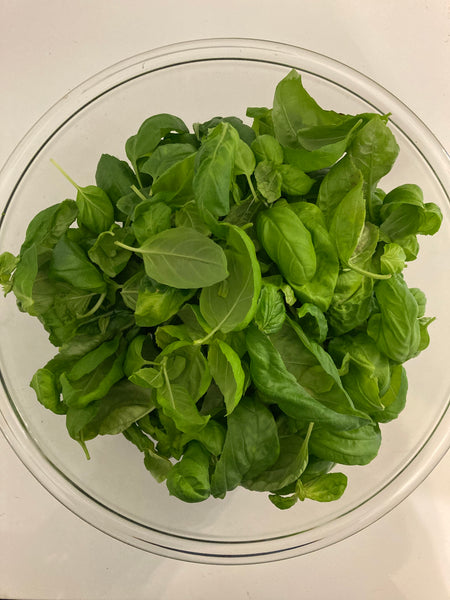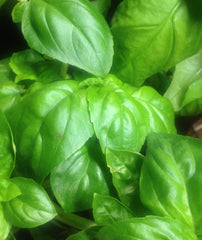How to keep basil producing for maximum return
One of the great things about basil is that it is a perenial, so while other plants will be done after harvest, basil can keep producing for years! Basil has many vitamins, minerals and antioxidantts including lutein, zeaxanthin, beta-carotene, and beta-cryptoxanthin. One could say a spoonful of fresh basil a day will keep the doctor away. Basil's health benefits come from these antioxidants and its esssential oils, both of which can be greatly reduced with drying, so opt for fresh basil whenever possible. .
To get the most out of your basil here are some growing tips:
1. Grow 2-3 plants per pot
After your basil seeds have germinated select the largest seedlings by supporting them while carefully plucking out the small, less vigorous plants. It is important to do this soon after the seeds have sprouted, before the plants develop roots, so as to not damage the roots of the more viable plants. If you missed the opportunity to pluck the small plants, use clean sharp shears to trim their stem(s) off at the base. The verdeGarden delivers nutrients to your plants' roots, allowing you to have more plants in a smaller space than in a soil garden, allowing for 2-3 basil plants per pot.

Removing the less vigorous seedlings from the coco coir puck.
2. Keep basil pruned
Basil likes to be pruned and will put on more vigourous growth with occassional trimming. Do not let your basil grow too tall, 6 inches (12cm) in height will suffice and encourages the plant to fill out and create denser growth. Frequent harvesting every 2-3 weeks also prevents flowering, which stops growth. Denser growth will allow for larger harvests, perfect for making pesto, or freezing or drying for storage. Use clean, sharp shears to trim just above a large leaf cluster approximately 6 inches up from the base. If your basil plant has flowered, snip the flowers off to prevent the leaves from turning bitter and harvest soon, or enjoy the flowers and start over with a new plant afterwards.

Red circles indicating where the top leaves were pruned to keep the plants at 6 inches (12 cm) in height.
Harvest the pruned leaves. Smaller amounts can be used in salads, sandwiches, and fresh on pasta or pizza.

Freshly pruned basil leaves from above with a fresh harvest of lettuce and swiss chard from the verdeGraze garden.
3. Harvest and Repeat
Before harvesting your plants, especially for larger quantities, run a fresh water cycle in your reservoir (no nutrients for 3-7 days). This allows the plant to use up stored minerals and improves flavour and sweetness. Some good options for larger quanitities of basil include freezing or dehydrating to store it, making pesto, or try this hummus basil recipe. Keep in mind fresh pesto will have more health benefits than dried. If you are short on time, you can chop the basil leaves into smaller pieces and add to an ice cube tray with water, freeze and use in dishes as needed.

Large harvest from verdeGarze indoor garden
4. Try different varieties
Did you know there are over 60 varieties of basil. We use organic and heirloom seeds that we know work well in the verdeGarden; however, you can also choose to use your own seeds. Check out our seed collections here. Our favourites are:
- Organic Genovese Basil - great for pesto, soups, and fresh on salads, pizza and pasta.

- Heirloom Red Rubbing Basil - also sweat and provides amazing colour and antioxidants.

- Organic Thai Basil - with its tasty licourice flavour, a must for Thai cooking!

